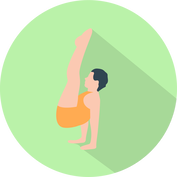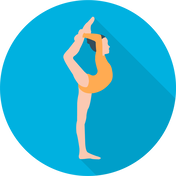Open Training is an invitation for practitioners to bring their aspirations and creativity to the studio. During these sessions, we not only provide Studio UP!, but also all the necessary materials to enhance your aerial skills. From poles, hoops to bands, all equipment is at your disposal so you can experiment, practice, and refine techniques. If you have equipment that isn't available in the studio, such as trapeze, you're also welcome to bring it.
While there isn't formal instruction during Open Training, our instructors are present to provide guidance, answer questions, and ensure that practices are conducted safely. We believe that autonomy in training is a fundamental part of personal growth, and Open Training is the perfect environment to cultivate confidence and self-expression.
These sessions are suitable for all levels, from beginners to advanced practitioners. It's a dedicated time to explore, challenge yourself, and celebrate progress, creating a community that shares a passion for aerial arts.
To ensure your Open Training is successful, follow these rules:
1- NO: Talking during training.
YES: Sharing experiences before and after training.
2- NO: Practicing tricks that pose a challenge for your level before learning them from an instructor.
YES: Tricks learned in classes and combinations of them, choreographies, or new tricks below your level.
3- NO: Teaching by students.
YES: Physical/psychological help and spotting.
While there isn't formal instruction during Open Training, our instructors are present to provide guidance, answer questions, and ensure that practices are conducted safely. We believe that autonomy in training is a fundamental part of personal growth, and Open Training is the perfect environment to cultivate confidence and self-expression.
These sessions are suitable for all levels, from beginners to advanced practitioners. It's a dedicated time to explore, challenge yourself, and celebrate progress, creating a community that shares a passion for aerial arts.
To ensure your Open Training is successful, follow these rules:
1- NO: Talking during training.
YES: Sharing experiences before and after training.
2- NO: Practicing tricks that pose a challenge for your level before learning them from an instructor.
YES: Tricks learned in classes and combinations of them, choreographies, or new tricks below your level.
3- NO: Teaching by students.
YES: Physical/psychological help and spotting.





